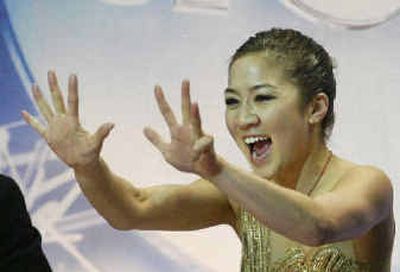Kwan orchestrates her ninth symphony on ice

PORTLAND – Michelle Kwan held up nine fingers and grinned at the camera. She has her place in history, a run as impressive for its longevity as its dominance.
Kwan won her ninth title at the U.S. Figure Skating Championships on Saturday night, tying Maribel Vinson for the all-time record. She earned four more 6.0s, giving her 42 at nationals in an illustrious career that began more than a decade ago when she was too young to wear makeup.
Now 24, Kwan is as dominant as ever, with no one in the United States coming close to challenging her.
“Nine incredible national championships,” Kwan said, looking stunned at the magnitude of what she’s done. “I don’t know, every one is so different and unique.”
It’s always the same story at U.S. championships. Kwan wins, and Sasha Cohen fails to come through when it matters most. Cohen finished second after botching two jumps and was lucky to finish ahead of up-and-comer Kimmie Meissner, who made a bit of history with the first triple axel by a U.S. woman since Tonya Harding did it in 1991.
Vinson won nine titles in the 1920s and 1930s, a mark that once seemed certain to stand. Gretchen Merrill, Tenley Albright and Peggy Fleming – they all won multiple titles, but none came close to Vinson.
But it’s somehow fitting that Kwan was the one to finally reach the pinnacle. Her former coach, Frank Carroll, trained with Vinson, and Carroll would often tell Kwan stories about Vinson and the lessons she’d taught him.
Vinson died when the plane carrying the U.S. team to the 1961 world championships in Prague crashed in Belgium. Vinson was coaching her daughters, Maribel Y. and Laurence, who had just won the U.S. title.
“There’s a cosmic connection between me and Maribel,” Kwan said. “She taught Frank and Frank taught me. To be with her is something.”
Her performance may not have been Kwan’s best – she was a little tentative and slower than she’s been in practice. But it was more than worthy of one for the record books.
Skating to “Bolero,” with a program choreographed by Christopher Dean, Kwan was the picture of grace in her golden costume, perfectly in sync with the music.
She picked up speed with every jump, until she was dancing down the ice on her final footwork. The crowd was cheering so loudly she could barely hear the end of her music, throwing back her arms and head in triumph. Fans jumped to their feet, and Kwan pumped her fist, shook her head and clapped her hands.
When she saw her 6.0s she beamed and raised her arms in triumph. Kwan got seven 6.0s this week, the last major competition where the century-old scoring mark will be used. The International Skating Union has already gone to a points-based system, and U.S. Figure Skating plans to follow suit.
“Sweet!” Kwan said, referring to her 6.0s. “I’m going to be sad when the 6.0 system goes away.”
The title was Kwan’s eighth straight, extending her record. She’s also a five-time world champion, and has silver and bronze medals from the Olympics. The only hole in her impressive resume is Olympic gold.
Cohen has yet to win a major title and she won’t get one if she keeps skating like this. She crashed hard on a triple lutz and had to put a hand down on the ice to keep from falling on her triple loop.
That wasn’t her biggest problem, though. Cohen is one of the most beautiful skaters around, so elegant she could practically sell tickets just for standing there. Even when she botches her jumps, she packs the rest of the program with explosive footwork and emotion.
But not this night. Her footwork was unexciting and the entire program was flat, slow and devoid of luster.
Cohen got two 5.9s and the rest 5.8s for artistry, enough to put her in second place. Had Meissner had a bit more presence on the ice, Cohen might have been bumped down another spot. But just 15, Meissner’s strength is still her athleticism.
Harding was the first U.S. woman to land the triple axel in 1991. “Since this is my first year in seniors, I thought I had nothing to lose,” said Meissner, who won the junior title last year and the novice crown in 2003.